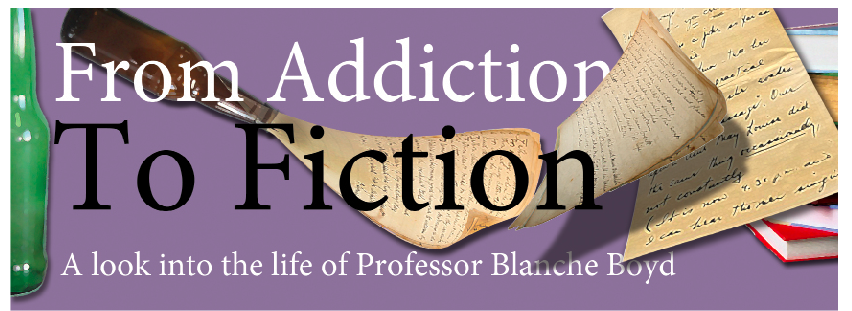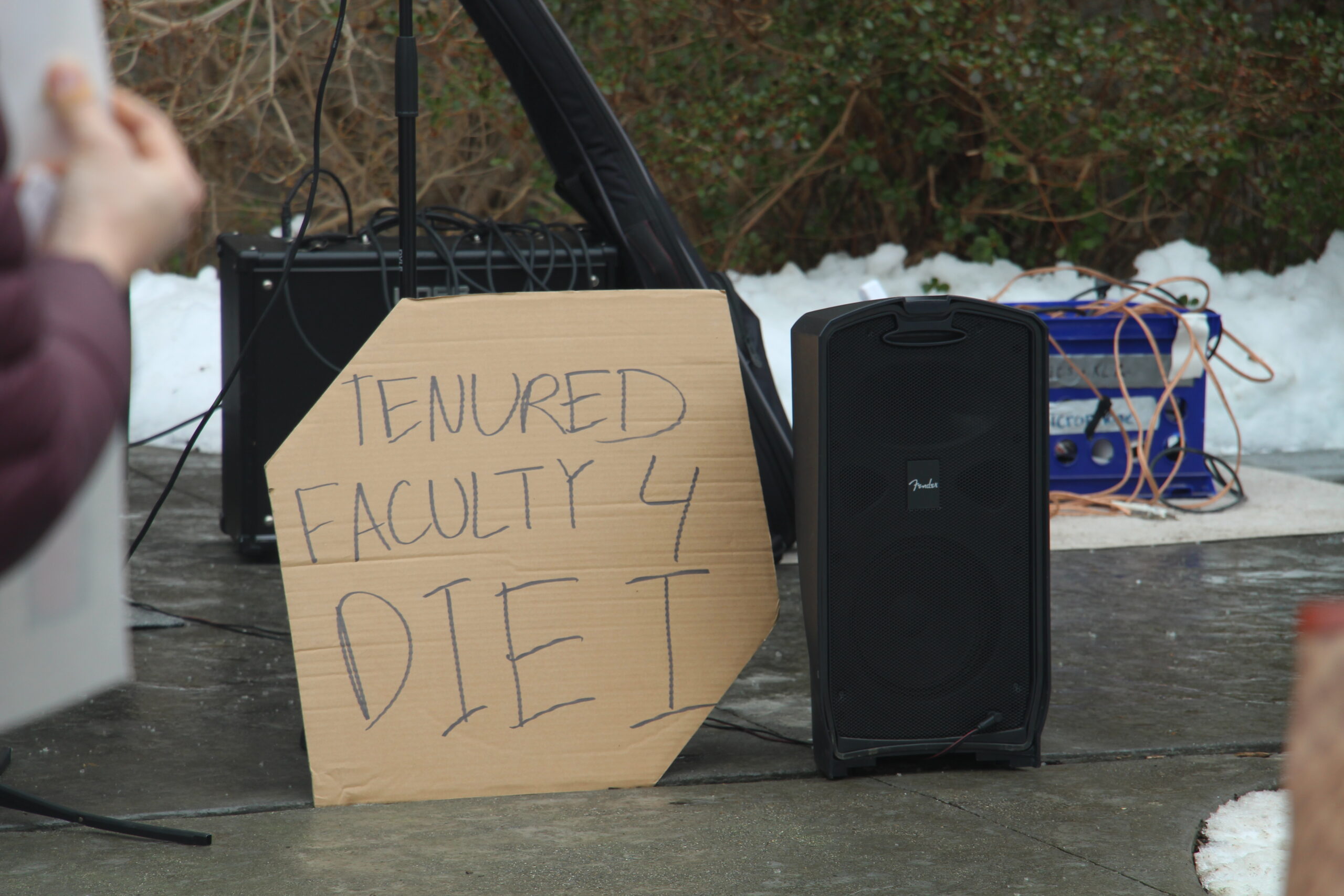 Blanche Boyd is the first to admit that hers is an unlikely story, from the depths of addiction to the solid stability of life as a wife, mother and college professor. But she has harnessed that journey into a life of writing and storytelling. “My life has been so wild, with such painful passages in it,” she says as she sits down across from me at a booth in the Blue Camel Café. “By telling my story I give my students permission to trust me.”
Blanche Boyd is the first to admit that hers is an unlikely story, from the depths of addiction to the solid stability of life as a wife, mother and college professor. But she has harnessed that journey into a life of writing and storytelling. “My life has been so wild, with such painful passages in it,” she says as she sits down across from me at a booth in the Blue Camel Café. “By telling my story I give my students permission to trust me.”
Boyd, who is now the Roman and Tatiana Weller Professor of English and Writer-in-Residence at Connecticut College, was born in Charleston, South Carolina to a family of “overt racists” which inspired one of her books, The Redneck Way of Knowledge. Even with their discriminatory undertones, Boyd admits that they were “kind and goodhearted people, without much respect for reason,” a quality that she valued most of all. “My mother used to say, ‘you’re too smart for your own good’ and I thought, what could that possibly mean? I sent her The Redneck Way of Knowledge one time and she left me a message saying that I turned out to be a better writer than she thought.”
Boyd pauses and laughs a little before saying, “Although that’s not the whole quote. My mother went on to say that I have a chip on my shoulder about sex and drugs.”
She began her academic journey at Duke University in Durham, North Carolina, where she received a C+ in English her first semester before being more or less asked to leave. “I was drunk all the time,” Boyd explains, “and a trouble maker. I used to hypnotize people. I told the Dean I was going to quit school and get married and she said, ‘good.’ I married a man who wouldn’t put up with my drinking. He didn’t even let me have a television. He told me to get serious, get a job and get my life together. I had never been able to listen to anyone before. He was a smart, stable, nice man and we loved each other.”
During the seven years she was married, Boyd attended Pomona College in Claremont, California as a “high risk student.” Ironically, she graduated with high honors and was elected to Phi Beta Kappa. She soon received a writing grant to go to Stanford and attended the university with her husband between 1967 and 1970.
“I started doing drugs with people at the writing center, and the short version is, I discovered I was a lesbian and my alcoholism came back in full force,” says Boyd. “In those years, being a radical lesbian and a radical feminist were pretty synonymous. I thought I was making a choice but years later I found out I wasn’t making a choice, just recognizing myself. After that, I went through a lot of homophobia with myself. I thought if I could write a novel, everything would be beautiful and sad. So I wrote a novel and it wasn’t; it didn’t change anything. So I left my husband and joined the revolution.”
The revolution brought Boyd to Vermont where she spent the next stage of her life protesting the war in Vietnam while living in a commune called Mayday. “In Vermont there were a lot of so-called revolutionaries, all white of course, that thought the revolution was going to start in Vermont, which was ridiculous. This was during the time of the Civil Rights Movement and the Black Panther Party, and there were only like ten blacks in Vermont,” Boyd explains sarcastically. “The fact that they thought something was going to happen in this backwater state was absurd, and I only stayed there for about a year and a half. I did a lot of drugs and eventually got arrested.”
With only a suitcase in hand, Boyd moved to New York where she bought a mattress and a fifty-dollar refrigerator that she held together with a piece of wire. “I also had a typewriter” Boyd adds, “and set out to be a writer. During those years my drinking and drugging kind of leveled out. It was like being on an escalator that only went down. So I thought the solution was to write another novel. I did but it wasn’t any different. Then I accidentally became a rock and roll critic, which was hysterical.”
During this time, the second piece Boyd wrote ended up on a list of the best books to read for rock and roll. She laughs and explains, “It was a ridiculous piece of crap and the more I said I didn’t know about music the more people thought I had integrity.” Her publicist spoiled her with booze and concert tickets, and on receiving a bottle of Jack Daniels, Boyd remembers she thought she had “died and gone to heaven.”
After her fling with the rock and roll scene, Boyd moved back home where she fell in with a group of drug-abusing rich kids. “I finally hit bottom” Boyd says, and was only shaken out of her addiction when one of her friends, who was also an addict, shot herself with a shotgun in 1980. “I was there. I saw it happen. There were pieces of her body on the wall, and she was conscious. It was horrible. It was one of those moments where you know your life has changed but you don’t know how, and I realized that she was more honest than me. We weren’t cool; we were dying and I didn’t know who I was or what I was doing. I think sanity is a really fragile thing, and that drugs and alcohol become easily abused.” The woman who shot herself survived and has been in a nursing home since she was the age of forty.
It took Boyd six months to get completely clean during which she recollects that, “it was in a way harder to quit drugs than alcohol. At one point I remember picking up the furniture like I was the Hulk and smashing it in my apartment.” On May 19, 1981, Boyd laid down drugs and alcohol and hasn’t had either since, changing her life utterly.
After just two weeks of sobriety, Boyd came to Connecticut College where she had her interview for a position as a one-semester teacher. She worked part time for about three years while becoming a better and better writer. She was soon known nationally and publishing in high profile magazines.
“I believed in what I was doing, and knew I was a good teacher.” It wasn’t long before Boyd was promoted to a full professor in the English department and she admits, “I was astounded. I tell my students that if I’m a person in a position of authority, then anything can happen.”
In the late ’90s, Boyd met a woman that she “didn’t screw things up with” and they’ve been together for fourteen years with two twelve-year old twins.
“My wife and children are the second best thing that ever happened to me, and I have to say second because without sobriety I would have never had a family of my own. I still go to AA almost every day and owe my life and success as a person and a writer to my sobriety. I never thought I would love anybody or anything the way I love my children. All I have to do is see them to be happy.”
Currently, Boyd teaches three creative writing courses: Writing the Short Story, Narrative Non-Fiction and the Seminar in Fiction, and has successfully published four novels: Nerves, Mourning the Death of Magic, The Revolution of Little Girls, and Terminal Velocity. In addition, she is working on the last book of a trilogy titled Children of Nod, and has many published articles and essays under her name, including The Redneck Way of Knowledge.
“My goal is to go to bed at night feeling like I’m part of what’s good in the world. When I got clean I went in a flash from being dangerous to colorful, from being part of the problem to being part of the solution. I feel like God’s final joke is that I’ve turned out to be such a happy functional person.” •










